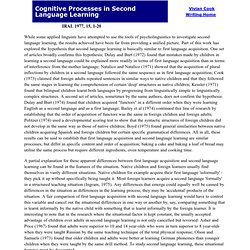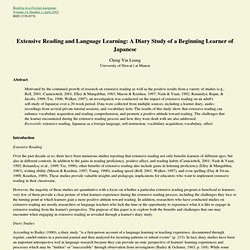

The Silent Period of Second Language Acquisition. Julio Foppoli explains the often misunderstood silent period in the second language acquisition process.

There are five different stages in the second language acquisition process: 1) The Silent Period 2) The Early Production Period 3) The Speech Emergence Period 4) The Intermediate Production Period 5) The Advanced Production Period Even though there is wealth of research on these different stages, out of these five periods, probably the most misunderstood, ignored or even unknown both by teachers and students alike is the first, the Silent Period, which will be the focus of our article today.
What is the Silent Period? The first stage of the language acquisition process is called “The Silent Period” simply because the students aren’t doing much talking yet. The main characteristic of this stage is that after some initial exposure to the language, the learner is able to understand much more than s/he can produce. “We’ve been working on the Present Tense for over two months now. How To Learn A Second Language. The 3 stages of language-learning evolution.
There are two keys factors that influence language learning: TimeMethod.

Cognitive Processes in Second Language Learning. While some applied linguists have attempted to use the tools of psycholinguistics to investigate second language learning, the results achieved have been far from providing a unified picture.

Part of this work has explored the hypothesis that second language learning is basically similar to first language acquisition. A partial explanation for these apparent differences between first language acquisition and second language learning can be found in the features of the situation. Native children and foreign learners usually find themselves in vastly different situations.
Native children for example acquire their first language 'informally' - they pick it up without specifically being taught it. Most foreign learners acquire a second language 'formally' in a structured teaching situation (Ingram, 1975). SpeakingFriends - Learn English Phrases Online. During the last decades, the primary focus of foreign language learning has been on grammar.

Nowadays, a new trend is emerging. While grammar is still important, it appears that it is better to leave it until much later – after a basic understanding of the foreign language has been developed through learning English phrases and vocabulary. This is a renaissance of ideas developed by great Enlightenment thinkers who managed to teach thousands of foreign language students without the help of computers and internet. In agreement with John Locke, a work by James Hamilton says: “The theory of grammar should be taught only when the pupil can read the language, and understand at least an easy book in it.”
There is a surprising truth to Hamilton’s words. Take for example an English language course where students learn how to say “I am”. The language learning progress can be much faster. We use two principles to make the system work. First, we use a memory technique called Spaced Repetition. Reading in a Foreign Language: Extensive Reading and Language Learning: A Diary Study of a Beginning Learner of Japanese. Reading in a Foreign Language Volume 14, Number 1, April 2002 ISSN 1539-0578 Extensive Reading and Language Learning: A Diary Study of a Beginning Learner of Japanese Ching Yin LeungUniversity of Hawai`i at Manoa Abstract Motivated by the continued growth of research on extensive reading as well as the positive results from a variety of studies (e.g., Bell, 2001; Camiciottoli, 2001; Elley & Mangubhai, 1983; Mason & Krashen, 1997; Nash & Yuan, 1992; Renandya, Rajan, & Jacobs, 1999; Tse, 1996; Walker, 1997), an investigation was conducted on the impact of extensive reading on an adult's self-study of Japanese over a 20-week period.

Data were collected from multiple sources, including a learner diary, audio-recordings from several private tutorial sessions, and vocabulary tests. Introduction Extensive Reading Over the past decade or so, there have been numerous studies reporting that extensive reading not only benefits learners of different ages, but also in different contexts. Diary Studies. 22 Tips For Learning A Foreign Language. When I arrived in Buenos Aires in the beginning of 2010, I could barely order food in a local restaurant.

Two years later, I calmly explained the mechanics of Russian grammar to a Guatemalan friend… in her native Spanish. Today, I’m conversationally fluent in both Spanish and Brazilian Portuguese, and low conversational in Russian. I’m not going to blow smoke up your ass and tell you it was easy or that there’s some shortcut or hack.
I practiced my ass off. Honestly, I’ve seen the supposed “hacks” for language learning, and none of them worked for me. Here are some language learning tips I’ve gathered over the past few years: 1. There are a few reasons for this. The second reason is that language is something that needs to be processed, not memorized. I believe the reason is that our minds place more priority on memories which involve actual human and social experiences, memories which have emotions tied to them. 2. 3. 4. 5. 6. 7. 8. 9. 10. “Where is the restaurant?” 11. The Five Principles of Effective Second Language Acquisition.